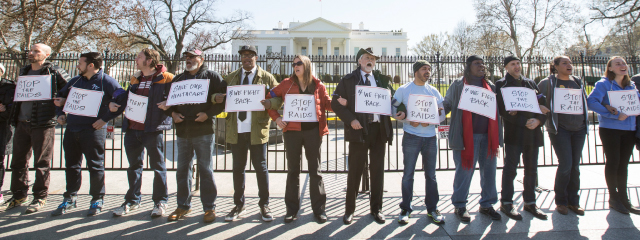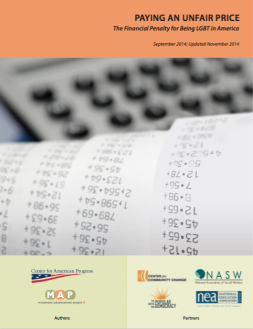Paying an Unfair Price: The Financial Penalty for Being LGBT in America
Summary
LGBT Americans have the same worries as other Americans when it comes to paying for healthcare and other needs, finding good jobs, and saving for the future. But the LGBT population–which includes parents, workers, retirees, people of color, and people with disabilities–faces another set of challenges that can result in increased economic hardship.
Anti-LGBT laws–at the federal, state, and local levels–have the emotional impact of telling LGBT people that they matter less than others, that their families and their health are not as important, and that their contributions at work are less valued. But these outdated and discriminatory laws also have serious economic impacts, causing LGBT people to have a harder time becoming financially secure and providing for their families.
In some cases, the legal inequality experienced by LGBT people results in lower incomes—for example, due to employment discrimination or the denial of family tax credits. This makes it harder for LGBT Americans to save for the future or cover basic necessities like rent, food, and clothing. In other cases, these same legal inequalities burden LGBT people with higher costs for needs like housing, healthcare, health insurance, and education.
This report describes how LGBT Americans pay an unfair price for being LGBT, and how anti-LGBT laws cause the most harm to the most vulnerable LGBT communities. The report also includes recommendations that would help end the unfair financial penalties that LGBT people in this country face simply because of who they are or whom they love.
Three Primary Failures of Law Financially Penalize LGBT People
The financial penalties facing LGBT people in the United States are the result of three primary failures in the law:
- Lack of protection from discrimination means that LGBT people can be fired, denied housing, and refused medically-necessary healthcare simply because they are LGBT. LGBT people experience credit discrimination, and transgender people face difficulties obtaining accurate identity documents, which can make it more difficult to secure employment, housing, and more. The financial penalty: LGBT people can struggle to find work, make less on the job, and have higher housing and medical costs than their non-LGBT peers.
- Refusal to recognize LGBT families means that LGBT families are denied many of the same benefits afforded to non-LGBT families when it comes to health insurance, taxes, vital safety-net programs, and retirement planning. The financial penalty: LGBT families pay more
for health insurance, taxes, legal assistance, and essential protection for their families in times of crisis. - Failure to adequately protect LGBT students means that LGBT people and their families often face a hostile, unsafe, and unwelcoming environment in local schools, as well as discrimination in accessing financial aid and other support. The financial penalty: LGBT young people and the children of LGBT parents are more likely to perform poorly in school and to face challenges pursuing postsecondary educational opportunities. This, in turn, can reduce their earnings over time.












